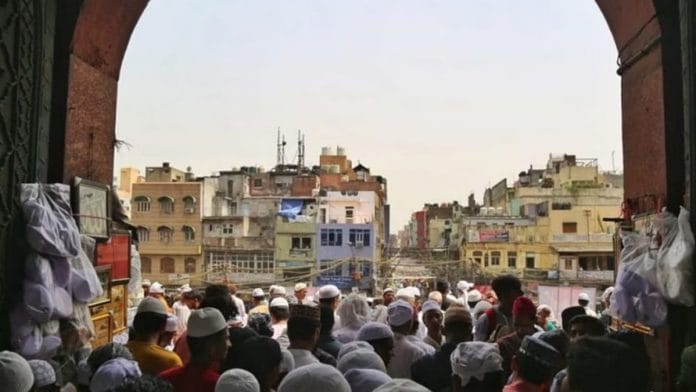Bharatiya Janata Party is eager to bring Pasmanda Muslims into their fold. It has been argued that in the shifting electoral landscape of North India, where opposition parties are trying to wean away its traditional voters, BJP is looking for new constituencies and an expanded voter base. However, it may not want to woo Pasmanda Muslims just yet. As a hegemonic project, Hindutva seeks to create a homogeneous and vertically aligned ‘Hindu’ political community and conflate it with the nation. Recognising Pasmanda Muslims at par with its strategically cultivated constituency of ‘Extremely Backward Castes’ will only promote horizontal unity among backward castes and undermine the vertical unity of the Hindu political community.
One quality of the BJP is that it will never dilute the distinctions it has created between the ‘self’ and the ‘other’, the self being the majority Hindu population and the other being the Muslim community. Outside the grand narrative of reaching out to “the deprived among Muslims and other minorities”, BJP has been astonishingly adamant against Scheduled Caste (SC) status to Muslim and Christian Dalits, calling them religions of “foreign origin”. The government has filed an affidavit claiming there is no existence of documented evidence to prove social disability suffered by both communities.
Though Prime Minister Narendra Modi has called on party workers to organise a ‘sneh yatra’ (solidarity march) in support of Pasmanda Muslims, the hypocrisy is quite explicit. As former Rajya Sabha MP and head of All India Pasmanda Muslim Mahaz (AIPMM) Ali Anwar said, Pasmanda Muslims don’t want ‘sneh’ (affection), but ‘samman’ (honour), which has been denied to them for long. He further added that if BJP had been genuinely affectionate toward the Pasmanda cause, it wouldn’t have been ambivalent in the face of rising Muslim lynchings and anti-Muslim riots, where most victims were Pasmandas.
Also read: Ashraafs say Islam is casteless. Then what explains their views on kufu, khutbah, firqas?
Decoding BJP’s Pasmanda outreach
It is safe to say that BJP is not extending an olive branch to Muslims, nor has it moderated its ideological stance on Hindutva. It also does not indicate BJP’s attempt at expanding its backward-caste support base to assimilate Pasmanda Muslims. In fact, doing this will prove counter-productive for the party. Any effort to absorb lower-caste Muslims in its traditional backward-caste social base will blunt its Hindutva credentials and sow ideological confusion in its voter base, as also in its party and cadre. The ideological premise of BJP’s backward-caste mobilisation in Uttar Pradesh and Bihar was not Mandal but Hindutva.
BJP’s long-term strategy has been to subsume ‘backward castes’ into the larger ‘Hindu’ political identity. For this, Mandal politics had to be neutralised, and its traditional backward caste-Muslim base splintered. For this, the BJP tried to mobilise EBCs by pitting them against Yadavs and Muslims. Their rising political influence ran parallel with the increased political marginalisation of Muslims. The surge in the representation of hitherto ignored castes, such as Kurmi, Koeri, Lodha etc., was counter-balanced by the political demolition of Muslims. In the new political setup, the rise of one meant the destruction of the other.
In response to BJP’s rise, Muslim voters previously fragmented along caste and class lines increasingly consolidated on communitarian lines. For example, in the Bihar elections held in October and November 2020, Muslims overwhelmingly united behind the Rashtriya Janata Dal (RJD) led ‘Mahagathbandhan’ or grand alliance. As per election research body Lokniti-CSDS, 76 per cent Muslims voted for this grand alliance. In comparison, only 5 per cent voted for the BJP-led National Democratic Alliance (NDA).
It is important to note that Janata Dal (United) or JD (U) had assiduously nurtured a support base among lower-caste Muslims for over a decade. However, its alliance with BJP prompted Muslim voters to unite on communitarian lines. Such consolidation was also seen in other states, casting a long shadow on the political fate of parties. While BJP comfortably won in UP, it lost by a huge margin in West Bengal and almost lost Bihar.
Also read: How Ashraaf Ulema use confusion about Prophet’s last speech to push casteism in Islam
New Ashraaf hegemony
Cultural and existential anxieties generated by BJP’s aggression toward Muslims have allowed the elite Ashraaf Muslims to re-assert their hold over the community. BJP’s threatening presence has helped them employ the motif of ‘qaum’ (community) and pose as cultural custodians of Indian Muslims. BJP understands that to foster political disorganisation among Muslims, it is crucial to separate Ashraaf Muslims from the rest.
BJP’s Pasmanda ‘outreach’ should be understood as an attempt to create an intra-religious-political identity among Muslims, which will weaken their electoral viability. On the local level, Muslims have increasingly consolidated behind candidates best poised to challenge the BJP. This also means that competition and rivalries among Muslims have been suppressed and sidelined due to ‘political and electoral compulsions’.
BJP hopes to stir the cauldron of Muslim politics again. The plan is to wean away chunks of lower caste and poorer Muslim votes by creating a class of beneficiaries among them. The party will dole out welfare benefits to them in the manner that they are already patronising poorer OBCs and Dalits in many states, especially UP. This, together with social justice rhetoric, can be used to provoke local political rivalries and caste antagonisms at the constituency level, thus reducing the weight of the Muslim voter bloc.
Rather than showing a major shift from the Rashtriya Swayamsevak Sangh (RSS)’s conception of citizenship and the way it defines Indian-ness, this outreach is a move to neutralise Muslims as a political force and disrupt the formation of a distinct Muslim political identity. Beyond the BJP’s electoral calculations, Hindutva seeks to completely neutralise and invisibilise Muslims from political, social and cultural spaces. BJP aims to homogenise the nation under a singular Hindu identity and suppress the articulation of alternate identities. Appropriating and assimilating Pasmandas is surely not how the RSS intends to do it.
(Edited by Zoya Bhatti)






